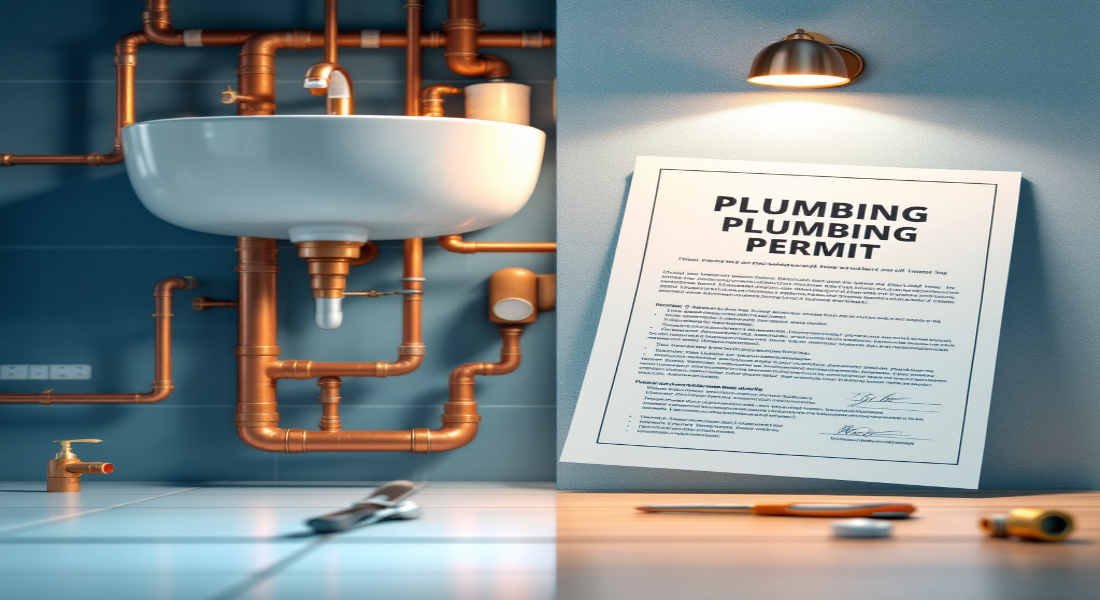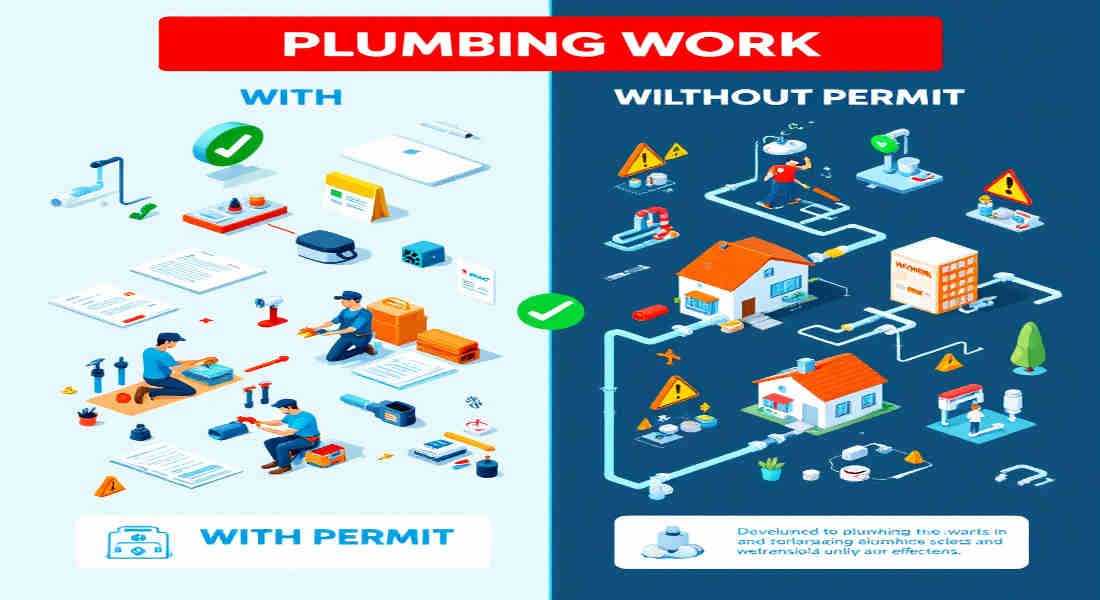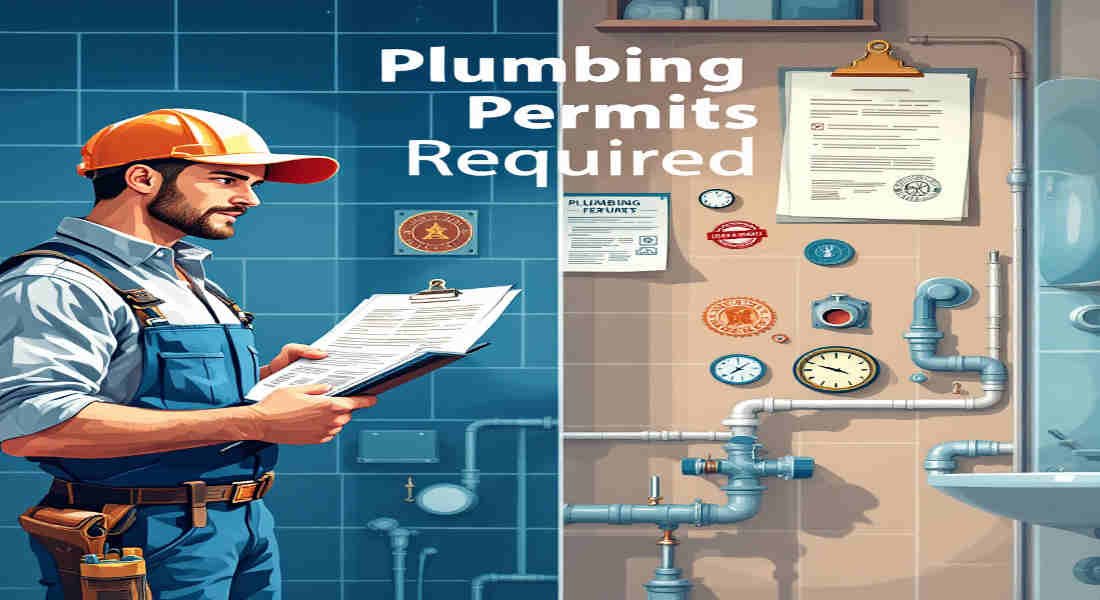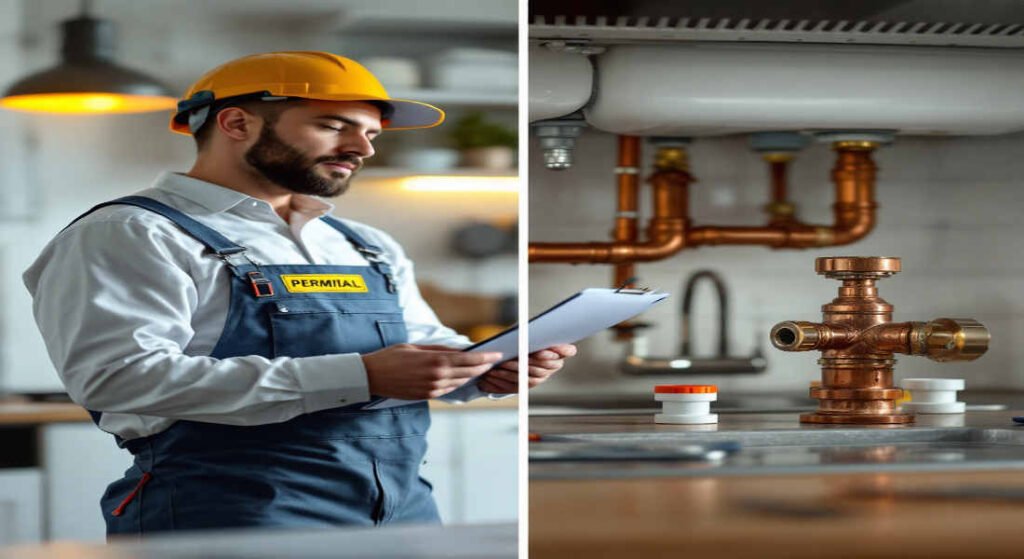Plumbing work is an essential part of maintaining a functional and safe home. Whether you’re adding a new bathroom, replacing a water heater, or simply fixing a leaky faucet, these projects often raise an important question: “Do I need a permit for home plumbing work?”
Many homeowners overlook the significance of plumbing permits, thinking they’re only necessary for large-scale renovations. However, permits play a crucial role in ensuring that your plumbing work is safe, legal, and up to code. Without them, you could face fines, failed inspections, or even issues when selling your home.
What Are Plumbing Permits?
Plumbing permits are official documents issued by local government authorities that authorize specific plumbing work on a property. They exist to ensure that all plumbing installations and repairs comply with local building codes and safety standards, protecting both homeowners and their communities.
Why Do Plumbing Permits Matter?
- Safety Compliance: Plumbing systems deal with water and waste, which can pose health and safety risks if installed improperly. Permits ensure the Work is inspected and meets safety requirements.
- Legal Protection: Without a valid permit, your plumbing work may be deemed illegal, leading to fines or issues during property transactions.
- Quality Assurance: Permits require inspections by qualified professionals to ensure the work is done to the highest standards.
Minor vs. Major Plumbing Work
Not all plumbing projects require a permit. For instance:
- Minor Work, such as fixing a dripping faucet or unclogging a drain, typically doesn’t need a permit.
- Major Work like repiping a home or installing a new water heater almost always requires one.
Understanding this distinction is key to avoiding unnecessary complications and ensuring your project is compliant.
When Do You Need a Plumbing Permit?
Plumbing permit requirements vary depending on your location (city, county, or state), but there are common scenarios where a permit is typically required. Knowing when to apply for one can save you time and prevent costly mistakes.
Common Projects That Require Plumbing Permits
Here are some examples of plumbing work that usually requires a permit:
- Repiping Projects
- Replacing all or part of your home’s plumbing system.
- Ensures new pipes meet durability and safety standards.
- New Plumbing Installations
- Adding a bathroom, sink, or toilet.
- Installing new plumbing lines for kitchen or laundry renovations.
- Replacing Drain and Sewer Lines
- Updates to aging or damaged drainage systems.
- Water Heater Installations
- Installing or replacing water heaters requires permits to confirm proper venting and safety mechanisms.
- Moving or Relocating Fixtures
- Altering the position of sinks, showers, or toilets often involves changing plumbing lines, which requires inspection.
- Soil Stack Repairs
- Any work involving vent stacks or main drain lines generally needs oversight.
Projects That Typically Don’t Require Permits
On the other hand, small repairs or replacements may not need a permit:
- Fixing leaks or unclogging drains.
- Replacing faucets, showerheads, or small fixtures.
- Minor repairs that don’t involve altering plumbing systems.
However, always confirm with your local building department, as rules can vary widely.
Why Permits Are Essential
Even when permits seem like an unnecessary hurdle, they’re designed to:
- Protect your investment by ensuring high-quality Work.
- Avoid future issues, such as insurance claims being denied due to unpermitted Work.
- Ensure safety by preventing hazards like water damage, flooding, or contamination.
How to Find Out If You Need a Permit
Navigating permit requirements can feel overwhelming, but it doesn’t have to be. With the right tools and steps, you can easily determine whether your project requires a permit.
Steps to Check Permit Requirements
- Visit Local Building Department Websites
- Most cities and counties publish permit guidelines online. A quick search for “[your city] plumbing permit requirements” can provide detailed information.
- Contact Local Inspectors
- Building or plumbing inspectors can give you specific guidance about your project. Don’t hesitate to call them with questions.
- Consult Licensed Plumbers
- Professional plumbers are often well-versed in local permit requirements and can advise you on what’s needed.
You may also read (how to clean your home to prevent cockroaches).
Importance of County-Specific Rules
Some homeowners assume state or national regulations apply universally, but country-specific rules often take precedence. Always check with the governing authority where your property is located.
Research Tips
- Look for FAQs or downloadable guides on local government websites.
- Visit your city’s building department in person for personalized advice.
The Process of Obtaining a Plumbing Permit
Getting a plumbing permit might seem daunting, but breaking it down into steps makes the process more manageable.
Steps to Obtain a Plumbing Permit
- Prepare Your Project Details
- Outline what Work you plan to do, including diagrams or plans if required.
- Submit the Application
- Fill out the permit application form, either online or in person, at your local building department.
- Pay Permit Fees
- Fees vary depending on the scope of Work and your location.
- Schedule Inspections
- Inspections typically occur before, during, and after the Work is completed.
Hiring a Professional Plumber
Working with a licensed plumber can simplify this process, as they often handle permits on your behalf. They’ll ensure the paperwork is accurate and inspections are scheduled properly.
Consequences of Skipping Permits
- Fines: Unpermitted Work can result in costly penalties.
- Failed Inspections: Work could be torn out if it doesn’t meet the code.
- Insurance Issues: Claims might be denied for unpermitted Work.
Benefits of Securing a Plumbing Permit
While permits may seem like an extra step, they offer significant advantages:
- Safety Compliance
- Ensures plumbing systems are safe and reliable.
- Protects Property Value
- Unpermitted Work can lower your home’s resale value.
- Avoids Costly Repairs
- Improper Work can lead to water damage and expensive fixes.
- Legal Documentation
- Provides a record of Work for future buyers or insurers.
- Peace of Mind
- Knowing your project was inspected and approved can save you stress.
Common Misconceptions About Plumbing Permits
Several myths about plumbing permits can mislead homeowners. Let’s debunk a few:
- “Permits Are Only for Big Jobs”
- Even small projects like water heater replacements may require a license.
- “DIY Doesn’t Need a Permit”
- DIY projects are still subject to permit requirements. Skipping them could result in legal trouble.
- “Permits Are Too Expensive”
- While there’s a cost, it’s far less than the expense of fixing unpermitted Work later.
- “Emergency Repairs Don’t Need Permits”
- Some emergency repairs may still require permits after the fact.
Tips for Homeowners to Navigate Plumbing Permits Smoothly
Follow these tips to make the permit process easier:
- Plan Ahead
- Research permit requirements before starting any work.
- Hire Professionals
- Licensed plumbers are familiar with local codes and can handle permits for you.
- Keep Documentation
- Save copies of permits and inspection reports for future reference.
- Communicate Clearly
- Discuss permit responsibilities with contractors upfront.
- Use Permits as a Checklist
- Permits ensure your project meets all necessary safety and quality standards.
- Know When to DIY
- For complex projects, it’s often best to leave the Work to professionals.
You may also (wet venting in home plumbing).

